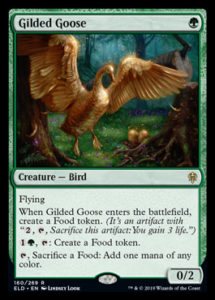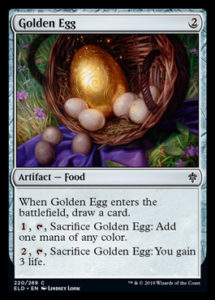“Good food, good eating, is all about blood and organs, cruelty and decay. It’s about sodium-loaded pork fat, stinky triple-cream cheeses, the tender thymus glands and distended livers of young animals. It’s about danger—risking the dark, bacterial forces of beef, chicken, cheese, and shellfish . . . Gastronomy is the science of pain. Professional cooks belong to a secret society whose ancient rituals derive from the principles of stoicism in the face of humiliation, injury, fatigue, and the threat of illness.” —Anthony Bourdain, The New Yorker, 1999
Throne of Eldraine spoilers have started. They’ve launched with a showcase of the latest innovation in Magic mechanics, and one of the most basic: Food. For the uninitiated, Food tokens are artifact tokens with the text: “(2), tap, sacrifice this artifact: You gain 3 life.” There’s nothing complicated about the mechanic, but it is satisfying in its simplicity. Were it actually food, it would be a wheat loaf—chemically complex, and the result of hours of practice and technical innovation, but deceptively anodyne.
That’s suitable. Bread, either fresh-baked or stale, was often employed as a defense against faerie mischief. The domesticity of the home and hearth, as embodied in a crust or slice, was an anchor against the spirit world. In Eldraine, it serves an even more vital function: literally keeping you alive (and giving you cheap tokens to animate).
It’s interesting that only players can consume food—and only the player who controls the Food, at that. There are no doubt cards that allow you to sacrifice Food tokens to put +1/+1 counters on creatures, draw cards, etc.; but the core functionality of Food mirrors Shadows Over Innistrad’s Clues in their core functionality. Magic’s version of food is selfish; you can’t share your Food with your opponent or teammate, which may suggest some moral about greed suitable for a fairy tale set. There’s an undercurrent of selfishness from what we’ve seen so far in the set—a kind of cloistered possessiveness demonstrated in the retelling of the Beauty & the Beast fairy tale and in Magic’s interpretation of the goose who lays golden eggs.

Eldraine seems like a beautiful world of gilt edges, but those edges can still cut, even if they’re pretty. Gilded Goose beautifully sets up a entire narrative: the goose lays you an egg immediately, proving its worth, which you can either consume for sustenance or “sell” for mana. You can feed the Goose more mana and preoccupy it for a turn while it lays another golden egg. Unfortunately, you can’t slaughter it for a minor benefit, which would suit the story of the goose that lays golden eggs, but the Magic moral of “Bolt the Bird” is going to get this goose cooked in short time.
Meanwhile, the printing of Golden Egg as a separate card implies an interesting subtheme in the set—Artifacts actively tagged as Food. This “food-ness” does not inherently give them the sacrifice-for-three-life ability, but Golden Egg has been given that ability. Hot Soup, for example, could be errata’ed to “Artifact—Equipment Food,” but it wouldn’t have the Food ability we’ll soon be accustomed to.

The etymology of “food” is extremely boring—it comes from the Old English “foda,” meaning “fuel or nourishment.” But that’s the point; the universality of “food” and the mundanity of it is what makes it resonant. Food is powerful because it’s omnipresent—not merely as fuel, but as iconography. Persephone was instructed not to consume any of the tempting food in Hades, but figured a handful of pomegranate seeds wouldn’t be a problem—the same thought process as Ofelia in Pan’s Labyrinth. Both were wrong.
Food ties you to a place, whether it’s to the netherworld or to the place your ancestors are from. The Sumerians wrote a poem to the goddess of brewing, Ninkasi, whose lines don’t just praise the goddess, but provide the basic recipe for baking bread and brewing sophisticated beers. It is not merely a song of praise, but an oral recipe. The Food offered up by Oko may be an Elk in disguise, and you shouldn’t ever trust the food offered to you by fairies.
Lorwyn had a minor theme of leaving food for the fairies; in Anglo-Celtic myth, these spirits were fond of milk and butter and other treats. Brownies, a class of diminutive house-dwelling sprite, were said to clean homes in exchange for a saucer of cream or milk left out as payment. In contrast, in Eldraine, they offer us food that gives us life. It’s odd to turn the tables on votive offerings—the gifts of propitiation given to gods or spirits—and I wonder if there’s going to be a twist there; if we’ll learn that we shouldn’t have been so eager to take the food offered by the fairies.
Food is culture and, like all culture, implies a political choice made at some point in production or in the supply chain. Someone suffers for your food; in most cases, someone in every step of the chain, from cultivation to harvesting to preparation, suffers. Impossible Burgers may be more moral than eating meat derived from factory farming, for example, but they’re still delivered to you by burning fossil fuels and only available to those willing to pay a premium. You could spend your entire life dedicated to ethical consumption, but you’re still consuming.
What deal have we struck with the forces of Eldraine when we pop a pie to gain a modicum of health? We’ll find out later this month—starting this week, in fact. But there lies something hidden beneath the tasty crust, something beyond nourishment.
A lifelong resident of the Carolinas and a graduate of the University of North Carolina, Rob has played Magic since he picked a Darkling Stalker up off the soccer field at summer camp. He works for nonprofits as an educational strategies developer and, in his off-hours, enjoys writing fiction, playing games, and exploring new beers.

